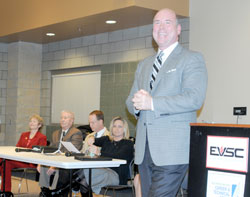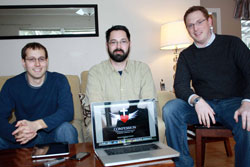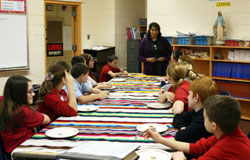Catholic News Around Indiana
Compiled by Brandon A. Evans
Diocese of Evansville
Public hearing on school choice attracts comments, concerns
 By PAUL R. LEINGANG (Message editor)
By PAUL R. LEINGANG (Message editor)
School choice and charter schools were among the topics of discussion at a public hearing chaired by House Speaker Brian Bosma (R-Indianapolis) Feb. 4 in Evansville.
Bosma presented his views, as did area Republican House members, and comments were taken from the audience.
“We have more kids in public schools than we have in Catholic schools,” said Bishop Gerald A. Gettelfinger. He urged the legislature to ensure that all Indiana schools provide “education of high quality” for the students.
The public hearing was called in part to get reaction to a legislative proposal — House Bill 1003 — which would provide state funds to students in need, allowing their families to choose a public or private school — even a faith-based school.
Bishop Gettelfinger pointed out that Catholic families pay tuition for Catholic schooling, in addition to the taxes they pay to the state for education. He said the proposal to provide state funds to students attending Catholic schools would be “a critical thing for our community.”
Participants at the hearing nearly filled the Assembly Hall at the Southern Indi-ana Career and Technical Center in Evansville.
Joining Bosma were District 78 Rep. Suzanne Crouch (R-Evansville),District 76 Rep. Wendy McNamara (R-Evansville), District 63 Rep. Mark Messmer (R-Jasper), District 75 Rep. Ron Bacon (R-Chandler) and District 74 Rep. Sue Ells-perman (R-Ferdinand).
Bosma authored House Bill 1002, which he said would offer some new possibilities for charter schools. Among other provisions, the bill would increase the number of entities that could sponsor a charter school. For example, the bill would add private universities — Notre Dame, for example — to the list that now includes only public universities.
Bosma attempted to head off questions about separation of church and state in regard to providing public funds for students attending private, Catholic or any other accredited school.
Bosma pointed out that “for higher education, this is what we do. We want to bring that down to the K-12 level.” He said the proposal was a shift in policy, from funding an institution to funding the student.
Photo caption: House Speaker Brian Bosma explains the purpose of the hearing; other legislators in attendance include Sue Ellsperman, Ron Bacon, Mark Mesmer and Wendy MacNamara; present but not visible is Suzanne Crouch. (Message photo by Paul R. Leingang)
(For this story and more news from the Diocese of Evansville, log on to the website of The Message at www.themessageonline.org)
Diocese of Fort Wayne-South Bend
Confession app helps with Reconciliation
 By Diane Freeby
By Diane Freeby
SOUTH BEND — Can modern technology help strengthen our faith? According to Pope Benedict XVI and some techno-savvy Catholics from South Bend, the right application can.
In his recently released papal document, “Truth, Proclamation and Authenticity of Life in the Digital Age,” Pope Benedict XVI says it’s not enough to just “proclaim the Gospel through the new media,” but one must also “witness consistently.”
Developers of Confession: A Roman Catholic App for Apple’s iPhone, iPad and iPod Touch think their product helps people do both.
As word of this new app spread primarily through the Internet, brothers Patrick and Chip Leinen and friend, Ryan Kreager, say feedback has been positive. The app, reportedly the only one with an Imprimatur, is designed to help prepare people to make a better confession.
(The Imprimatur, given by Bishop Kevin C. Rhoades in this case, is an official declaration by a Church authority that a book or other printed work may be published. It declares the published work contains nothing offensive to Catholic teaching on faith and morals.)
“The app is really built for two kinds of people,” explains Ryan. “For Catholics who go to confession regularly, it gives the user information. They enter their name, age, their sex, their vocation and their last confession date, and it generates an examination of conscience based on that information.”
Centered on the Ten Commandments, the examination would be different for a young mother than for a teenage boy. The examinations were provided by two different priests explain the developers, who say that’s what allowed them to receive the Imprimatur.
“It’s also for people who’ve been away from the Church and want the opportunity to go to Confession,” he says. “You go to the examination of conscience and it literally walks you through, step by step, your confessions as you’re in the confessional.”
Patrick recalls one instance during testing. A man who hadn’t been to confession in 20 years used the app and made his way back to the Sacrament.
“Just the fact that someone had used the app like that, even before it was released to Apple … that’s the coolest thing in the world!”
Photo caption: Ryan Kreager, Chip Leinen and Patrick Leinen say they’re recently developed Confession app is designed to help people with their examination of conscience, and also to help people return to the Sacrament of Reconciliation. “It’s very exciting for us,” says Ryan, “especially in light of the Holy Father’s exhortation to redeem the Internet and use new media and social media for evangelizing. This just seemed like a perfect fit.”
Cristy Jordán brings dual cultural passion to teaching
 By Kay Cozad
By Kay Cozad
FORT WAYNE — Cristy Jordán is a junior high teacher at St. Joseph-St. Elizabeth Ann Seton School in Fort Wayne and with her Latino heritage and educational experience she brings the passion of generations past to the work she loves. Currently she teaches Spanish to fifth- through eighth-grade students and is also the school’s language progress provider. “I assess students with dual languages and watch their progress,” says Jordán.
Jordán, who has deep roots in both the Latino and American cultures, brings her spunky personality and intellect along with a familiarity of the Latino community to the table that makes teaching a perfect fit for this young mother of two.
A Fort Wayne native, Jordán was born the fifth of seven children to Elisa and Cristobal Jordán, who also fostered many other children along the way. When asked about her family Jordán becomes animated with pride as she recalls the history of her Latino/American heritage.
Her mother, Puerto Rican born Elisa Torres-Jordán, came to America in 1955 as a young girl, sent by her parents, as they would all of their children, with two of her 10 siblings in search of a better life. The 15-year-old spoke no English, but was determined to earn the highly coveted Catholic education.
Elisa found herself at Central Catholic High School pleading with then-Father J. William Lester, principal of the school at the time, for a chance to earn her diploma there. After much deliberation about language barriers, Father Lester eventually admitted Elisa who earned her diploma with valedictorian status.
Jordán’s enthusiasm for Catholic education is fed by her desire that all children have the opportunity she was given. And her understanding of the Latino community will assist her in creating an educational environment where the adults in the Catholic families will be catechized by their children attending Catholic schools.
Jordán says passionately, “If my mom hadn’t had her opportunity, I wouldn’t be who I am. Everyone should have access to a Catholic education. I want to be part of what makes that happen … I feel like I have to be that voice.”
Photo caption: Spanish teacher Cristy Jordan instructs St. Joseph-St. Elizabeth sixth graders on the etiquette of the dining table. She teaches Spanish to fifth- through eighth-grade students at the St. Joseph campus in Fort Wayne.
(For these stories and more news from the Diocese of Fort Wayne-South Bend, log on to the website of Today’s Catholic at www.todayscatholicnews.org)
Diocese of Gary
It’s all about making your dreams come true
Story by Steve Euvino
HOBART—For Daniel “Rudy” Ruettiger, life is not about making one tackle — which he did. It’s about the journey that led to that tackle and beyond. “I never gave up on my dreams,” Ruettiger told a packed St. Bridget parish center, Feb. 5. The inspiration for the 1993 movie Rudy, Ruettiger related to the Mardi Gras audience how he struggled – not just to get to the University of Notre Dame’s football practice squad.
One of 14 children, he was dyslexic but not diagnosed until later in school. He entered the Navy before working in a power plant, where he saw his best friend killed.
Never the top student, he worked hard to enroll at Holy Cross College, eventually moving across the highway in South Bend to Notre Dame.
Once at ND in 1974, Ruettiger walked on the Fighting Irish football team as a member of the prep squad. He got to dress for his last home game against Georgia Tech in November 1975. Coach Dan Devine inserted Ruettiger late in the game, and on the final play he sacked the Tech quarterback, earning a ride on his teammates’ shoulders out of Notre Dame Stadium.
In football time, Ruettiger played 27 seconds for the Irish. He never put on pads again. Still, he said, “Even if I played one second, it’d be a dream come true. The power of a dream is giving someone hope. All the hard work was worth it, even when it was darkest.”
The Mardi Gras, coming at the end of Catholic Schools Week, was a benefit for St. Bridget School, and Ruettiger encouraged his audience to continue to support the parish school. Recalling his own experiences in school, Ruettiger noted that people learn differently and that he learned through the people who inspired him – education through inspiration. "Empower people and give people confidence. That’s when it happens,” he said. “I was not smart, but I figured out how to do it.”
Speaking to the cheers of “Ru-dy, Ru-dy,” Ruettiger added that some people may have called him a dummy in school, but not anymore. “Work hard and ask questions,” he learned from his teachers. “You only fail by not trying and not asking questions. It’s not what you learn but how you learned.”
(For this story and more news from the Diocese of Gary, log on to the website of the Northwest Indiana Catholic at www.nwicatholic.com)
Diocese of Lafayette
Little gifts make a big difference
By Kevin Cullen
CRAWFORDSVILLE — Dozens of times each year, missionaries from the Lafayette diocese fly to Haiti to perform surgeries, distribute medicines, repair houses, clothe children and install water lines.
Others, like 89-year-old Patricia “Pat” Hauck, help long-distance. For the past 20 years, her gifts have consisted of an odd combination: peanut butter and costume jewelry.
“It just shows that no matter how small it may be, a ministry can make a big difference in the lives of people,” said Father Dennis Faker, her pastor at St. Bernard Church. “This is something she can do from her home.”
St. Bernard’s Haiti ministry has been active for 21 years. Hauck visited Haiti in 1990 and 1996, and she still supports the work of Sister Mary Alban Bouchard, CSJ, a Sister of St. Joseph who serves the poor there.
“Once you see them, you can’t get them out of your system. They haunt you,” Hauck said of the Haitians. “You realize how affluent you are. The poorest people here don’t compare to the poverty there.”
Since 1990, Hauck has asked fellow parishioners to save their eight-ounce plastic margarine tubs for her. She’d fill a plastic bag with them, enclose a $20 bill, and seal the bag. They were delivered by local missionaries, who added them to their suitcase items.
Sister Mary Alban, a native of Toronto, Canada, serves all nine Haitian dioceses, but her home base is the city of Cap Haitien. She used the money from Crawfordsville to buy large quantities of peanut butter from a woman who ground her own peanuts. The margarine tubs were then filled with peanut butter, sealed and given to hungry Haitian families.
“They get so little protein,” Hauck said. “It’s such a cheap thing to do.”
The woman who made the peanut butter hasn’t been heard from since the January 2010 earthquake. A successor hasn’t been found yet, so Hauck said she plans to ask former President Jimmy Carter for help. His family owns a Georgia peanut farm.
In the meantime, Hauck is focusing on her other Haiti project: collecting and shipping used jewelry.
A table in her family room is loaded with costume jewelry donated by fellow parishioners, who drop it off in a collection container at church. A woman who runs a local resale shop also gives her bracelets, necklaces and earrings that customers haven’t been able to sell.
With pliers, wire, glue and salvaged parts, Hauck makes needed repairs, then cleans the pieces, puts them in donated plastic bags, and sends them to Sister Mary Alban. Student missionaries from St. Thomas Aquinas Church in West Lafayette have taken countless bags to Haiti for her.
(For this story and more news from the Diocese of Lafayette, log on to the website of The Catholic Moment at www.thecatholicmoment.org)
 By PAUL R. LEINGANG (Message editor)
By PAUL R. LEINGANG (Message editor) By Diane Freeby
By Diane Freeby By Kay Cozad
By Kay Cozad